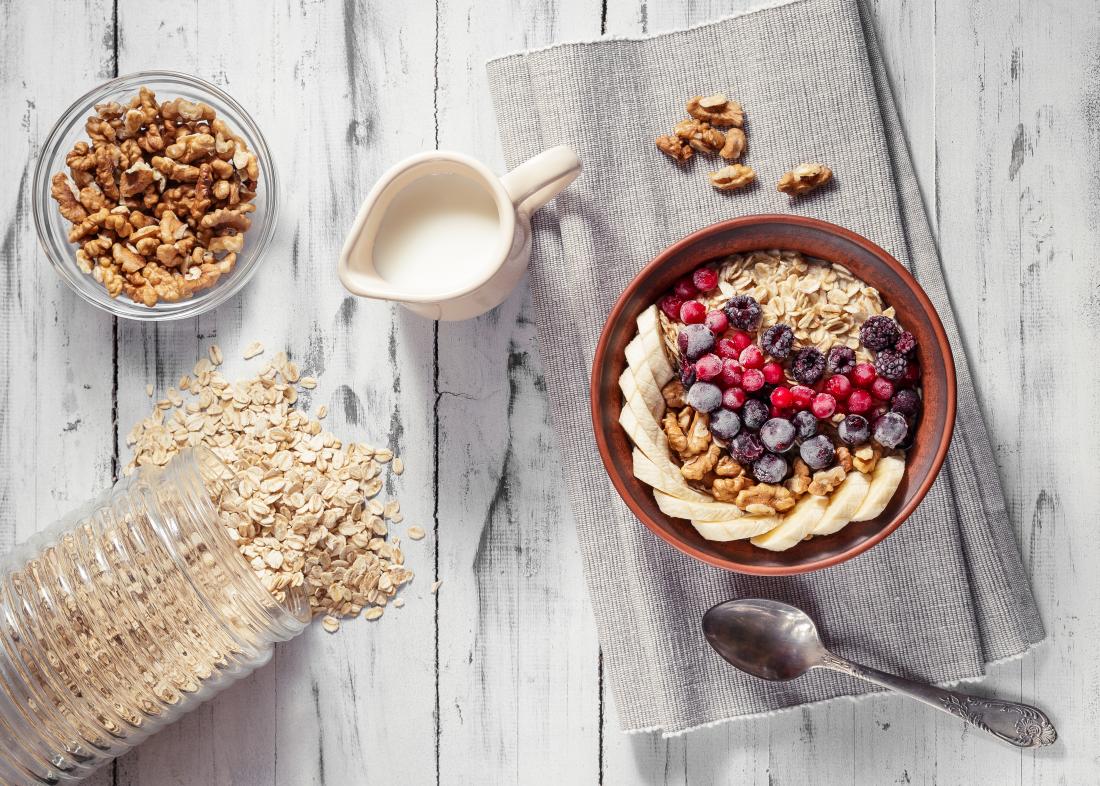Breakfast is a critical time to fuel your body with the energy it needs for the day ahead. Skipping the meal can lead to lethargy and fatigue later on in the day, and can also contribute to more serious health problems down the line.
Eating a breakfast that’s rich in complex carbohydrates, protein, and healthy fats will give you lasting energy. Here are some breakfast foods to consider adding to your daily routine:
1. Eggs
Eating a healthy breakfast is essential to keeping energy levels up and maintaining a stable mood throughout the day. Getting the right balance of protein, carbohydrates and healthy fats will help you stay energized and focused through the rest of your day.
Eggs are a great breakfast option because they are high in protein, which helps keep you feeling full longer. They are also a good source of choline, which stimulates brain development and function and has been linked to improving memory retention.
Moreover, eggs are rich in heart-healthy nutrients such as folate and unsaturated fatty acids. These can help lower the risk of heart disease and stroke, as well as a number of other health conditions.
In addition, eggs are packed with antioxidants and vitamin D (41 IU per large egg) which can help protect your cells from the damaging effects of oxidative stress. These nutrients can also improve your sleep quality, boost your immune system and even prevent cancer.
They are also one of the best sources of iron, which is an essential nutrient that promotes the growth and repair of tissue. Plus, they contain lutein and zeaxanthin, two important antioxidants that can help prevent damage to the eyes.
They are also high in fiber, which helps keep you full for a long time. Lastly, they are an excellent source of vitamins A, B6, C and D. This combination of nutrients can make eggs an energizing breakfast that you will enjoy for the whole day.
Also Read: Rajkotupdates.news: Drinking lemon is as Beneficial as eating it!
2. Oatmeal
Oatmeal is a great choice for breakfast because it’s filled with complex carbohydrates that provide a slow burn of energy. It’s also an excellent source of fiber, which promotes a feeling of fullness, and it’s low in sugar.
Oats also boost serotonin production, which can help you manage stress and enhance learning and memory function. In addition, they’re rich in antioxidants that fight free radicals.
Eating oatmeal in the morning can also help you feel less hungry later in the day, which can help you avoid overeating at lunchtime or grabbing a high-calorie snack before bed.
However, you’ll want to make sure you’re eating a whole-grain variety like steel-cut oats or old-fashioned oats that aren’t packed with sugar. That’s especially important if you’re eating packets of flavored instant oatmeal, says registered dietitian Beth Czerwony.
You can also add in a spoonful of almond butter for some healthy fat and protein. A tablespoon of almond butter has 3.3 grams of fiber and 6.7 grams of protein, which can help you feel fuller for longer.
Another nutrient-dense food that’s an excellent choice for breakfast is fruit, which has a significant amount of soluble fiber that can lower blood pressure. Plus, fruit has B vitamins, potassium and iron to support cardiovascular health, explains registered dietician Stephanie Coburn.
To boost the nutrient density even further, eat your oatmeal with toppings such as nuts or seeds. Nuts and seeds contain healthy fats, protein, B vitamins and minerals that can fuel your body all day long. They’re also a good source of calcium, which helps maintain strong bones and teeth.
Also Read: 5 Breakfast Foods to Boost Your Energy
3. Bananas
Bananas are a great choice for breakfast, because they offer lots of nutrients that help boost energy. They are also low in calories and have a high fiber content, making them a good option for those looking to lose weight.
They are also packed with other important vitamins and minerals, such as potassium and magnesium. Potassium is essential for maintaining healthy blood pressure and heart function, while magnesium supports muscle health and bone health.
The banana is also a great source of tryptophan, which may help people with sleep problems. Tryptophan is an amino acid that promotes the production of serotonin, a brain chemical that improves mood and relieves anxiety.
However, if you’re going to eat bananas for breakfast, it’s important to keep in mind that they’re high in natural sugar and moderately acidic. That means that they will energise your body, but they can also spike your blood sugar levels, leading to a mid-morning crash.
That’s why you should pair your banana with another nutritious food, like a hard-boiled egg or a piece of whole grain toast. These foods provide protein, which will keep you full and energized until lunchtime, while they also give your stomach the fuel it needs to digest all of your other meals during the day.
In addition to carbs, bananas also contain dietary fiber and some important vitamins and minerals. They’re a good source of vitamin C, which can support immune function and fight off disease-causing free radicals.
Bananas are an excellent way to get your recommended daily dose of potassium, which is important for heart health and keeping your blood pressure under control. They are also a great source of vitamin B6, which supports the growth and development of cells, including those involved in the immune system.
4. Nuts
Nuts are a great source of protein and are high in fibre, which keeps you feeling fuller for longer. They also contain vitamins and minerals, which are essential for your body to function properly.
They’re also low in fat and cholesterol, so consuming them for breakfast is a good way to lower your risk of developing heart disease and diabetes. Plus, they’re packed with antioxidants that fight free radicals in your body and help to protect against ageing.
Soaking nuts in water is also a good idea, as it helps to boost their health benefits. This is because it removes the phytic acid that inhibits digestion, so your body can get more of the nutrients it needs from the nuts.
Another reason to include nuts in your breakfast is that they are a great source of potassium. This nutrient is important for nerve and muscle function. It’s also beneficial for pregnant women because it reduces the risk of neural defects in babies.
The other main benefit of eating nuts for breakfast is that they can help you to lose weight. They’re high in protein, which means they provide a boost to your metabolism and make you feel more satisfied.
As a bonus, nuts are loaded with omega-3 fatty acids, which can help prevent heart disease and other serious illnesses. They’re also a good source of iron and calcium, which are vital for your immune system.
They’re a tasty way to start your day and are an easy addition to any diet. But remember that nuts are high in calories, so they should be eaten in moderation.
Also Read: Soymamicoco: The superfood you want for your food regimen due to the fact it is full of nutrients
5. Fruit
Fruit is an excellent choice for breakfast because it provides you with a wide range of nutrients and is low in calories. It is also a great source of fiber, which is important for maintaining a healthy digestive tract and keeping you feeling full throughout the day.
Unlike cereals, bread and muffins, fruits do not contain processed sugars that can cause blood sugar levels to rise. In addition, fruit is a good source of vitamins, minerals and antioxidants that can help prevent chronic disease and make your body healthier.
Another benefit of fruit for breakfast is that it can aid weight loss. This is because fruits are calorie-dilute and high in water, which means they burn calories much faster than most other foods.
However, it is important to remember that you should always eat a balanced diet in order to maintain a healthy weight. This includes a variety of different food groups, including proteins, vegetables and slow carbs like fruits.
Eating only fruits for breakfast is not the ideal way to start the day because it can leave you feeling hungry all day long, make you more likely to get constipated and lead to lower energy levels.
You should always eat a combination of protein, slow carbohydrates and fiber in your breakfast. This will ensure you feel full and satisfied for longer, so that you won’t want to snack throughout the day.
A delicious and nutritious option for your morning meal is to blend up a smoothie with a base of yogurt and fresh or frozen fruit. This will give you a balanced meal that is easy to prepare and can be enjoyed on the go.

